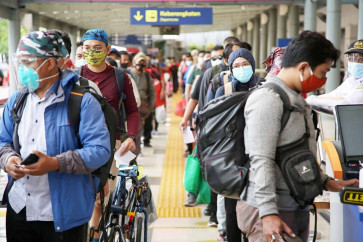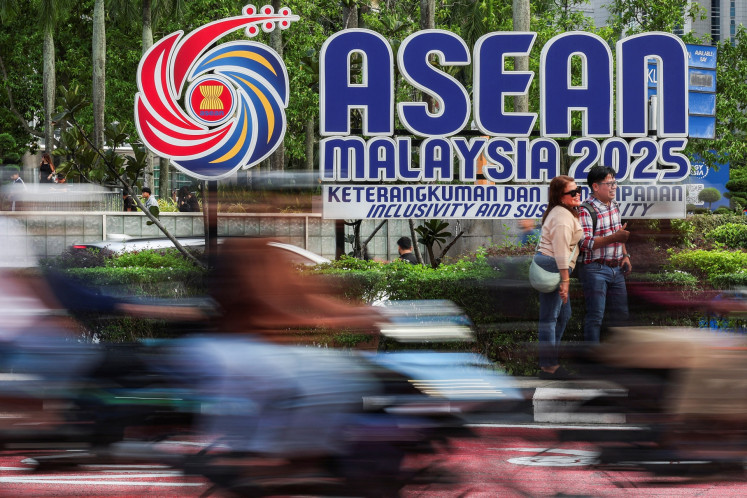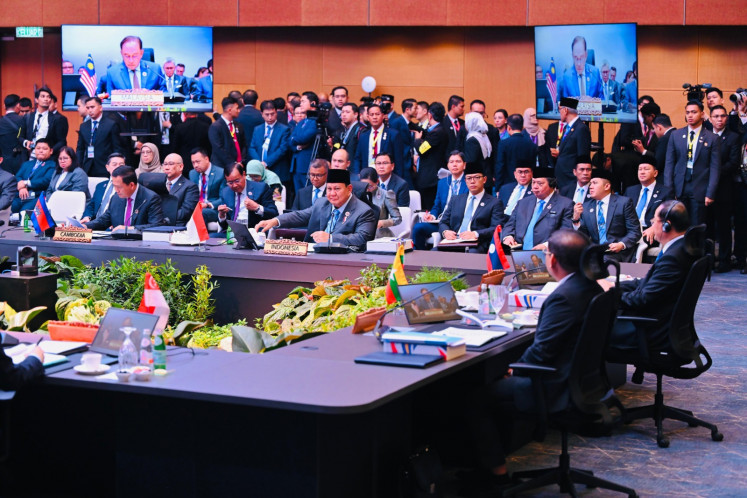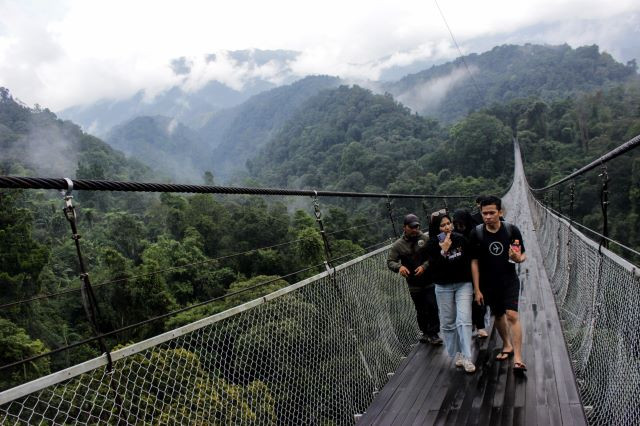Popular Reads
Top Results
Can't find what you're looking for?
View all search resultsPopular Reads
Top Results
Can't find what you're looking for?
View all search resultsRI may choose China bullet train
To buy or not to buy: Sales girls in China Railway uniforms stand by miniatures of Chinese-built bullet trains exhibited at Senayan City Mall in Jakarta last month
Change text size
Gift Premium Articles
to Anyone
 To buy or not to buy: Sales girls in China Railway uniforms stand by miniatures of Chinese-built bullet trains exhibited at Senayan City Mall in Jakarta last month. China was in fierce competition with Japan to win a contract to build a high speed rail link between Jakarta and Bandung.(JP/Ricky Yudhistira) (JP/Ricky Yudhistira)
To buy or not to buy: Sales girls in China Railway uniforms stand by miniatures of Chinese-built bullet trains exhibited at Senayan City Mall in Jakarta last month. China was in fierce competition with Japan to win a contract to build a high speed rail link between Jakarta and Bandung.(JP/Ricky Yudhistira) (JP/Ricky Yudhistira)
T
span class="caption">To buy or not to buy: Sales girls in China Railway uniforms stand by miniatures of Chinese-built bullet trains exhibited at Senayan City Mall in Jakarta last month. China was in fierce competition with Japan to win a contract to build a high speed rail link between Jakarta and Bandung.(JP/Ricky Yudhistira)
The Indonesian government may name China to build Indonesia's first high-speed train after the latter made it clear that the bullet train project would not require state funds or a government guarantee.
State-Owned Enterprises Minister Rini Soemarno said that China had in principle agreed to carry out the high-speed train project under a business-to-business scheme with no state budget or government guarantee involved.
'It [the Chinese government] has even agreed to build the train stations and to conduct technology transfers,' she said in Beijing on Wednesday night.
Rini added that the Chinese government had agreed to jointly produce train cars not only for high-speed, but also electric and light trains, which would be developed in Indonesia. Apart from local use, the train cars could also be exported to other Asian countries so that they could generate foreign exchange for Indonesia, she said.
To support the program, China has agreed to build an aluminum plant in Indonesia, which could provide the raw materials for the production of the train cars.
President Joko 'Jokowi' Widodo earlier denied reports that the government had scrapped the high-speed train project. He said that his government wanted the project construction to be carried out with no state budget.
'I'm waiting for the [project] calculations [from investors]. If it makes sense, go ahead. So, it is not that the project is canceled,' he said in Doha, Qatar, as quoted by the Cabinet Secretariat on Tuesday.
Earlier this month, Jokowi announced that his office had dropped the project because it would partly use the state budget and would require a government guarantee. Besides China, Japan also bid for the country's first bullet train project, set to connect Jakarta and Bandung.
'We will develop a medium-speed train instead,' Jokowi said in a statement distributed by Presidential chief of staff Teten Masduki, earlier this month. 'The development will not use any part of the state budget, directly or indirectly. The government will not provide any viability gap fund. The cooperation will be under a business-to-business scheme.'
Coordinating Economic Minister Darmin Nasution said recently that a bullet train was not economically viable for such a short distance of only 150 kilometers, with five to eight projected stops along the way. The train would reach a maximum speed of only 200 kilometers per hour from a potential of 300 kph.
The medium-speed train was also to be 30 to 40 percent less expensive than the high-speed train, which would cost around US$6 billion.
The announcement ended the widely publicized tug-of-war between Japan and China over the project.
Meanwhile, Rini said the government would follow up on the latest discussion with China so that a deal could be sealed and the construction could soon kick off.
She added that her ministry had formed a consortium consisting of state-owned construction company PT Wijaya Karya (WIKA), state-owned train manufacturer PT INKA, toll operator PT Jasa Marga and plantation company PTPN VIII to run the high-speed train project.
WIKA corporate secretary Suradi told The Jakarta Post on Thursday that Rini had last contacted his firm early this month, instructing WIKA to reassess the bullet train project.
'Currently, we are conducting an internal consolidation while waiting for further government instruction,' he said.
In China, Rini also witnessed the signing of a loan commitment worth $3 billion between the China Development Bank (CDB) and state-owned lenders Bank Mandiri, Bank Rakyat Indonesia (BRI) and Bank Negara Indonesia (BNI) to finance infrastructure development in Indonesia.
The agreement allows the three banks to obtain $1 billion each for a tenure of 10 years, with 30 percent of the amount drawn down in Chinese yuan to finance infrastructure projects and trade, especially between the two countries.
At the same time, another Chinese financing giant, the Industrial and Commercial Bank of China (ICBC), signed a memorandum of understanding with the Indonesian government to provide $20 billion in loan commitments to a number of state enterprises. (prm)
_____________________________
To receive comprehensive and earlier access to The Jakarta Post print edition, please subscribe to our epaper through iOS' iTunes, Android's Google Play, Blackberry World or Microsoft's Windows Store. Subscription includes free daily editions of The Nation, The Star Malaysia, the Philippine Daily Inquirer and Asia News.
For print subscription, please contact our call center at (+6221) 5360014 or subscription@thejakartapost.com









